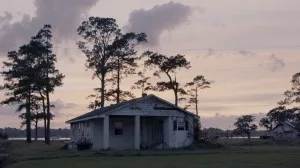For the descendants of Elijah Reels, an area of coastal North Carolina in Carteret County has been their sanctuary – where they could raise their families, earn a living, and enjoy the bounty and the pleasures of the waterways.
But in recent decades, those descendants — Gertrude Reels, her children, and their children — have been trying to hold onto the family land, caught up in a legal system that historically advantages white interests over those of African Americans like the Reels.
The family’s long struggle — which has seen two members of the family, Melvin Davis and Licurtis Reels, jailed for years for defying a court order — is told in the documentary Silver Dollar Road. The film directed by Oscar nominee Raoul Peck (I Am Not Your Negro) is now streaming on Prime Video.

“When you are there, you feel that you in a sort of, I can’t say paradise, but for them it is because it’s their home,” Peck tells Deadline. “It’s where they were born, it’s where their ancestors were. It’s where they have all their memories. It’s where they have their livelihood. That’s the most important thing.”
Silver Dollar Road (named for a two-lane stretch that extends through the 65 acres of land originally purchased by Elijah Reels in 1911) is based on a lengthy ProPublica-New Yorker article that explores the systemic way in which land has been taken from African Americans for over a century.
“A group of economists and statisticians recently calculated that, since 1910, Black families have been stripped of hundreds of billions of dollars because of lost land,” author Lizzie Presser writes in the article (she is an executive producer of the documentary). Presser quotes a researcher who told her, “If you want to understand wealth and inequality in this country, you have to understand Black land loss.”

The Reels’ story of “Black land loss” mostly dates back to 1970 when Mitchell Reels – father of Gertrude and grandfather of Melvin and Licurtis – died without a will (the ProPublica-New Yorker article notes that many African Americans of that era and even into today did not trust the court system and thus were far less inclined than whites to make out a will). The absence of a will meant the land became so-called “heirs’ property, a form of ownership in which descendants inherit an interest, like holding stock in a company,” as Press writes.
If the family had stuck together 100 percent, perhaps all that later transpired could have been avoided. But as the film indicates, in 1978 Shedrick “Shade” Reels, an unscrupulous brother of Mitchell, “sold” a major chunk of the family’s waterfront land – 13 acres — to a developer (the use of quotes around “sold” is appropriate because Shade arguably wasn’t entitled to sell the land; nonetheless, the choice parcel legally fell into outsiders’ – that is to say, white — hands).

It’s a complicated legal story, as Peck readily acknowledges.
“One of the key decisions I took very early on is that I was not going to go into the ups and downs of a judicial case where lawyers and judges themselves cannot find a solution. It would’ve been a dead battle from the get-go,” the director says. “So I decided to concentrate on the family itself and their voice. That means giving them the opportunity to tell their story, and especially because they are great storytellers. They are incredible personalities. They are incredible, intelligent people who know how to tell what happened to them.”

Among those who speak in the film are Mamie Reels Ellison and her niece Kim Renee Duhon, “two fierce women defending their rights and fighting to protect their ancestor’s land and their brothers and uncles Melvin and Licurtis,” as press materials for the film put it. Mamie, Kim and others in the documentary describe what the land has meant to them and how it became a gathering place for so many in Carteret County, not just the Reels and their relations.
“There is a vast Black community… in that vicinity. And that part of the property, the beach, was a place where most people who could not go to any other water place in the region would come here,” Peck explains. “And especially the Black population felt that was the only place where not only they could go, but also where they felt safe — like Mamie said, a place where you didn’t feel harassed.” Harassed, that is, by white people in law enforcement or other positions of power.

When Elijah Reels bought the land in the early 1900s, it was considered sub-optimal – marshy plots not well suited for farming. But across many decades it grew in value. Whites began to build mansions along nearby waterfront areas and ply their yachts in the idyllic sounds and bays. The developer who “bought” the land from Shade sued to remove Melvn and Licurtis from the property – to kick them out of their own place – and to build fancy homes there for wealthy buyers.
“We see exactly what was behind it. It’s the same development that has been happening everywhere in that region, all along the coast,” Peck says, “because the goal is to make more money and to make it a touristic place for rich people. That’s what it is.”

But Melvin and Licurtis told a judge they wouldn’t leave the property they had forever called home. The judge tossed them in jail on contempt charges. Normally, a jail term in a civil contempt case would last a few months, if that. Not so for Melvin and Licurtis.
“They believed so strongly in their right to the property,” Presser writes in the ProPublica-New Yorker article, “that they spent the next eight years fighting the case from jail, becoming two of the longest-serving inmates for civil contempt in U.S. history.”
Silver Dollar Road made its world premiere in September at the Toronto International Film Festival, going from there to the Camden International Film Festival, Hot Springs, Heartland, Philadelphia and other festivals. Earlier this month, it was named to the DOC NYC shortlist of the year’s best feature documentaries.
Peck, a director of nonfiction and fiction, including the 2017 narrative film The Young Karl Marx, was born in Haiti and served as his country’s minister of culture for a couple of years in the 1990s. He studied industrial engineering and economics in Germany and later obtained a film degree from the German Film and Television Academy in Berlin. He views the dynamics of Black land seizure in the U.S. in broader historical terms.

“It’s a continuum of the same policy of chasing, killing Indigenous people and stealing their land,” he says. “And the very idea of land property is an imported idea on this continent. Because all inhabitants of this continent — North and South — always considered land as something that did not belong to them. It was nature. And their only task was to preserve that land, to be the best custodian of that land. When the European came, they came with the concept of property, of commodity. And every piece of land could be bought, exchanged, or sold, and the whole system, which will give [rise to] the capitalist system was constructed. So, it’s just a few centuries back. We are still in the middle of it.”
Peck adds, “Land until today is an incredible, important piece of stability, of economic stability. And minorities are still being deprived of it. Even urban gentrification is exactly the same process. And it’s always quote, unquote ‘legal.’ It’s structural.”


